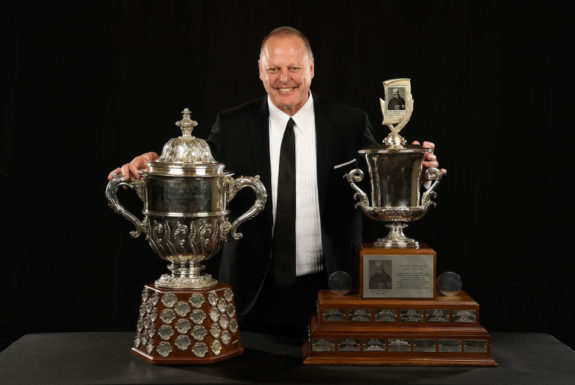Prior to entering the fourth season of his first NHL coaching contract, the New York Rangers organization terminated head coach David Quinn’s contract, as announced today. As initially reported by The New York Post, assistant coaches Jacques Martin, David Oliver, and Greg Brown follow the same fate. (from ‘Rangers fire coach David Quinn with eye on experienced replacement’, New York Post, 5/12/2021)
Related: New York Rangers Fire Head Coach David Quinn
The news is not particularly unexpected as general manager Jeff Gorton and president of the organization John Davidson were also fired the previous week. It is clear the Rangers are making every move necessary to bring a Stanley Cup back to New York City — and do so quickly.
Options for Replacing the Rangers’ Coach
Though Quinn did not outlast previous coach Alain Vigneault, he seemed to be better suited as a longer-term solution for the Rangers. Hired specifically for his reputation as a developmental coach on the college hockey level, the Rangers extended an offer to Quinn to begin his professional coaching career back in 2018.
While the decision to employ a first-time NHL head coach for such a young team shifting gears seemed like a questionable move at first, Quinn proved his developmental capabilities once again. This is illusrated by the improved game of Kaapo Kakko and Filip Chytil.

The Blueshirts will require a replacement head coach who is patient, experienced, and highly communicative. With the search commencing immediately, there are several options available on the coaching market, but making the wrong hire is undeniably consequential at this stage.
Not only does Quinn’s departure leave a hole, but now the team needs to adequately replace Jacques Martin and his Cup experience, along with his expertise on the penalty kill. The penalty kill was one of the bright spots this past season, and the Rangers will need to prolong success in this area while under the new staff. Replacing Martin with a defensively-minded coach will be key to further development of their particularly young defensemen.
Frontrunning names for the position include former Vegas Golden Knights coach Gerard Gallant, former Toronto Maple Leafs coach Mike Babcock, former Arizona Coyotes coach Rick Tocchet, and ex-coach of the Columbus Blue Jackets (and former Rangers coach) John Tortorella.
Though Quinn came to New York with some NHL coaching history as an assistant, it is likely the Rangers will hire the most experienced coach who is qualified and ready to guide the team far into the postseason.
Gallant May Be the Top Choice
The Post report also indicated Gallant appears to be the top candidate. The Prince Edward Island native was hired as Vegas’s first-ever coach and guided the team to their illustrious Stanley Cup Final in their inaugural season. Here’s why the 57-year-old emerges as the first choice.
Vegas’s team was composed of several established NHL players, similar to the Rangers, and that could be key to why Gallant could work in New York. He certainly has the résumé and a historical one at that. Taking a brand new team all the way to the Stanley Cup Final? That is a résumé qualified to take on the lofty expectations of New York sports.

In the 2017-18 season, Gerard took his group of “odd men out” and built them into a well-oiled machine that beat out the other established NHL clubs during their Cup chase. Rightfully so, he secured the Jack Adams Award as coach of the year following the Knights’ record-breaking season.
Not only was Gallant able to rapidly cultivate team chemistry, but he was able to maximize production in his players. William Karlsson is perhaps the most blatant example. The Swedish forward was selected by the Knights from Columbus in the Expansion Draft.
Prior to his 78-point debut in Vegas, Karlsson tallied only 55 career points in 204 games. The point total in his first year breaks down as such: 43 goals and 35 assists; his career-high prior was nine goals and 19 points. No one would have seen this breakout coming from Karlsson.
Gallant credited Karlsson’s emergence that came from chemistry with his linemates and also the confidence that came as a byproduct. “It’s all confidence. I mean, he’s got a lot of confidence. You watch him play and he plays a two-way game and I think when you play good defensive hockey you get more scoring chances because you pay a price down there and it leads to more offense…” Gallant stated. Since he became a Knight, his point totals never dipped nearly as low as his numbers from previous seasons.
Now, he was 25 years of age during his first year with the Knights. This is near the median age of the Rangers, meaning Gallant could work his magic with the young group but also the older crowd. Forward Chris Kreider could potentially benefit from Gallant’s attention. Kreider played well under Quinn, and the possibility of him setting the team example via offensive production and his intangible qualities is exciting.

The good news is Gallant would be in a great position to manipulate the lines in New York. With many young players still developing their own skillset and the deep inventory at each position, Gallant has many tools at his disposal to recreate successful line chemistry and identity.
Gallant was praised for his reputation as a “players’ coach,” which could be beneficial for the Blueshirts in the sense that this style is typically synonymous with a notable communicative upside. He also brings a sense of calmness, and he has comfortability seeing eye to eye with the team’s natural leaders. With the established veteran core on Broadway, this is an ideal fit. It would be disastrous to have a coach come in who vies for control over the younger core.
Yet despite his historic accomplishments, why was he out of a job, and what would it mean for the Rangers?
Gallant’s Fated End in Vegas
Gallant’s release from Vegas actually came as a surprise – to him and the league. After all, he recently won the Jack Adams by a landslide. Though details never materialized regarding Gallant’s departure (and they often conflict), reports indicate that better coaching on the market was the motive.
Indeed, his replacement, Peter DeBoer, twice took his new team to the Stanley Cup Final within his first season of manning the New Jersey Devils and San Jose Sharks; Vegas did not exactly need a new coach as a last-ditch effort for a postseason shot. (from ‘Golden Knights’ justifications for Gerard Gallant’s firing ring hollow,’ Las Vegas Sun, 01/16/2020) Yet, after Gallant’s three-season run in Vegas, it was over despite how completely rash or nonsensical any explanation seemed.
Goaltender Marc-Andre Fleury and backup Malcolm Subban ran into struggles prior to Gallant’s firing. The style of defense had to be modified on several occasions before the start of each season. The offense needed to pick up. These are factors that had to be involved in the shock firing but fell onto Gallant’s shoulders entirely.
As for the Rangers, who are in a compromising position that requires a good outcome quickly, the hiring process should be mulled over. The evidence is there that Gallant can work with his team, his colleagues, and upper management. The bizarre fate of his career in Vegas should not cloud his accomplishments as an NHL coach. His nine years of NHL coaching experience paired with playoff experience help suit him well for the position.